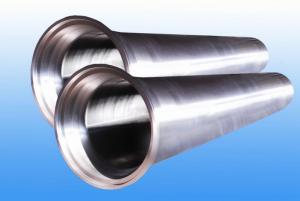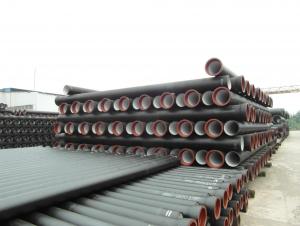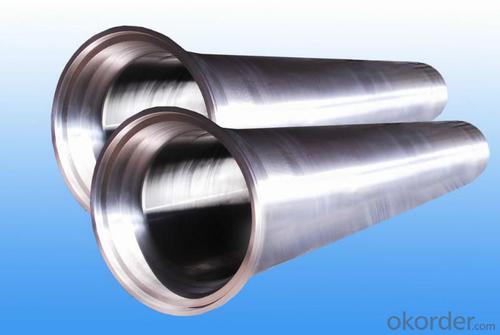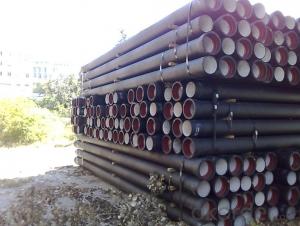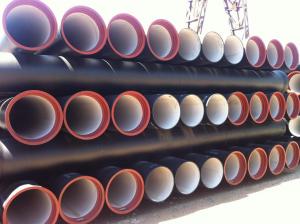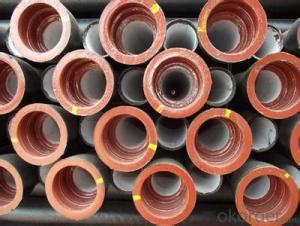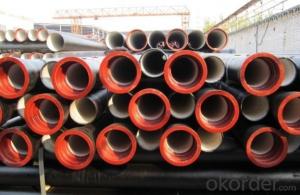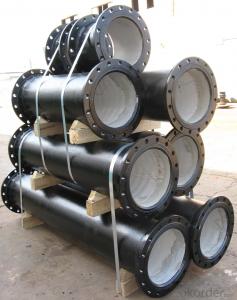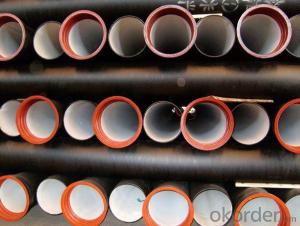Ductile Iron Pipe of China ISO2531 DN500-1DN1000
- Loading Port:
- China main port
- Payment Terms:
- TT or LC
- Min Order Qty:
- 10000 m.t.
- Supply Capability:
- 200000 m.t./month
OKorder Service Pledge
OKorder Financial Service
You Might Also Like
1.Ductile Iron Pipe Description :
1) Pipes confirm to ISO2531,K9 class,T type joint,6m long,with inside cements lining conform to ISO4179, outside Zinc
spraying(130g/m2) and bitumen coating(70μm) conform to ISO8179.
2) Pipe ends: Spigot and socket ends, with 100% SBR rubber gaskets accoding to ISO4633
3) we can do third party inspection according to customer's request.
2.Main Features of the Ductile Iron Pipe:
•High yield strength
•High tensile Strength
•High corrosion resistance
•Pressure Resistence
1. Material: Ductile iron grade 500-7/ 450-10 in accordance with ISO1083
2. Standard: ISO 2531, EN545, EN598, ANSI, AWWA
3. Certificate: ISO9001, ISO14001, SGS, NSF, WRAS
4. Test: In accordance with ISO 2531 / EN 545 / EN598 and 100% water pressure test
5. Length: 6m or cut into 5.6m, 5.7m, 5.8m
6. Internal Lining: Cement, conform to ISO4179
3.Ductile Iron Pipe Images:
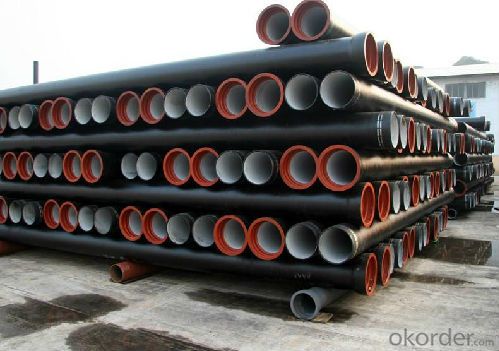
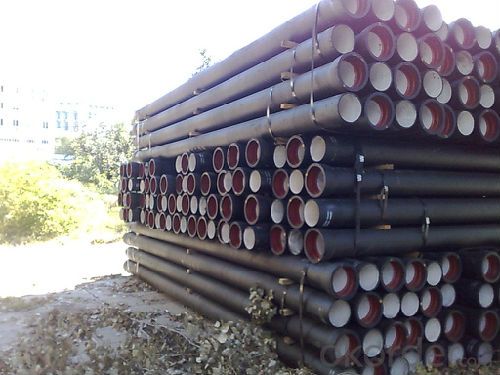
4.Ductile Iron Pipe Specification:
Standard: API SPEC 5L 44th eidtion,ASTM A252-98(2007)
Grade: A53 Grades A/B, ASTM A106 Grades B/C,ASTM A179
AWWA, C200, ASTM A139, ASTM A120, API 5L Grade B
X42, X52, X56, X60, X65, X70, X80, X100
Weld Alternatives: LSAW
OD size range: 6.4~44.5mm
Wall thickness: 406.4~1422mm
Note: Other grade can also be provided after consulting. Special design are available
for coal slurry conveyance LSAW line tube -- Service
5.FAQ:
We have organized several common questions for our clients,may help you sincerely:
1.Q: Why would you choose ductile iron pipe rather than other pipe materials?
A:The reasons are obvious for that not only ductile iron pipe possesses the inherent strength and flexibility of ductile
iron, combined with proven corrosion protection systems, but also the cost savings can be achieved from design to
installation and commissioning.
2.Q:Why can you guarantee the inner of pipes can’t be corroded?
A: High alumina cement mortar lining and sulphate-resistant cement mortar lining. These two special linings are applicable
to inner anti-corrosion for sewage pipes, improving resistance to erosion of the sewage components.
- Q: How do ductile iron pipes perform in high-temperature water applications?
- Ductile iron pipes possess remarkable strength, durability, and exceptional mechanical properties, rendering them suitable for diverse applications. However, certain factors must be taken into consideration when utilizing them in high-temperature water scenarios. Typically, ductile iron pipes exhibit satisfactory performance in high-temperature water settings up to a specific threshold. The exact temperature constraint hinges on the particular grade of ductile iron employed and the duration of exposure to elevated temperatures. Generally, ductile iron pipes can endure temperatures ranging from 350 to 400 degrees Fahrenheit for brief periods without suffering significant deterioration or loss of strength. Nevertheless, it is crucial to acknowledge that prolonged exposure to high temperatures can have adverse effects on ductile iron pipes. When subjected to elevated temperatures, these pipes may undergo thermal degradation, which can result in diminished mechanical properties, heightened brittleness, and even eventual cracking or failure. To mitigate the risks associated with high-temperature water applications, several precautionary measures can be implemented. Firstly, selecting a suitable grade of ductile iron with an elevated temperature tolerance can enhance the pipes' performance. Secondly, incorporating adequate insulation or heat shielding measures can minimize direct heat transfer to the pipes, thereby reducing the likelihood of thermal degradation. Furthermore, frequent monitoring and maintenance of ductile iron pipes utilized in high-temperature water settings are crucial to promptly identify any indications of degradation or damage and take appropriate remedial actions to prevent failure. In conclusion, although ductile iron pipes typically perform well in high-temperature water applications, it is imperative to thoroughly evaluate the specific conditions and requirements of the application to ensure their sustained performance and integrity.
- Q: How do ductile iron pipes handle traffic vibrations?
- Ductile iron pipes are highly resistant to traffic vibrations due to their inherent strength and flexibility. These pipes have the ability to absorb and dissipate the energy generated by traffic vibrations, minimizing any potential damage or stress on the pipes. Additionally, their sturdy construction and high tensile strength make them less susceptible to cracking or breaking under the impact of traffic-induced vibrations. Overall, ductile iron pipes provide excellent performance and durability in handling traffic vibrations.
- Q: What are the typical pressure surge protection measures for ductile iron pipe?
- To ensure the integrity and longevity of ductile iron pipe, various measures are commonly employed to protect against pressure surges. These measures encompass the following: 1. Surge tanks serve as effective tools for absorbing and mitigating the impact of pressure surges on ductile iron pipe. These tanks are typically positioned strategically at critical points in the pipeline system, such as near valves or pump stations, providing a reservoir to contain excess pressure. 2. Air release valves are indispensable components within ductile iron pipe systems, serving the purpose of releasing trapped air and preventing the formation of air pockets. These valves maintain a stable pressure within the pipe, reducing the risk of pressure surges during operation or abrupt changes in flow. 3. Pressure relief valves are designed to safeguard ductile iron pipes by releasing excessive pressure when it surpasses a predetermined threshold. These valves are usually installed at strategic locations in the pipeline system and programmed to open when the pressure exceeds a safe limit, diverting the excess pressure to safeguard the pipe from damage. 4. Surge suppressors are devices installed in ductile iron pipe systems to absorb and dissipate pressure surges. These devices function as shock absorbers, lessening the impact of pressure fluctuations and protecting the pipe from harm. Surge suppressors are particularly effective in situations where pressure surges occur frequently or are severe. 5. Ensuring an appropriate pipe wall thickness is another critical measure for pressure surge protection in ductile iron pipe. By selecting a pipe with the correct wall thickness, engineers can guarantee the pipe's ability to withstand the pressure surges it may encounter during operation. This measure helps prevent pipe failure or rupture caused by excessive pressure. It is essential to note that the specific pressure surge protection measures employed for ductile iron pipe may vary depending on factors such as the application, pipe size, operating conditions, and regulatory requirements. Consulting experts in pipeline engineering and design is imperative to determine the most suitable pressure surge protection measures for a particular ductile iron pipe system.
- Q: Are ductile iron pipes suitable for use in irrigation sprinkler systems?
- Ductile iron pipes, known for their durability, strength, and corrosion resistance, are a suitable option for irrigation sprinkler systems. With their high tensile strength, they can withstand heavy loads and high pressure, ensuring a consistent water supply. Moreover, their long lifespan reduces the frequency of maintenance and replacement, making them cost-effective. In summary, ductile iron pipes are reliable and appropriate for use in irrigation sprinkler systems.
- Q: Can ductile iron pipes be used for above-ground installations?
- Yes, ductile iron pipes can be used for above-ground installations. Ductile iron is a type of cast iron that has higher tensile strength and flexibility, making it suitable for a variety of applications including above-ground installations. It is commonly used for water distribution systems, sewage systems, and industrial pipelines. Ductile iron pipes are resistant to corrosion, withstand high pressure and temperature, and have a long lifespan. They are also available in various sizes and can be easily connected using different joint types. However, it is important to ensure proper support and protection against external factors such as sunlight and impact to prevent any potential damage.
- Q: Can ductile iron pipes be used for stormwater drainage?
- Yes, ductile iron pipes can be used for stormwater drainage. Ductile iron pipes are known for their strength, durability, and ability to withstand heavy loads, making them a suitable choice for various applications, including stormwater drainage systems.
- Q: Can ductile iron pipes be used for water supply networks?
- Yes, ductile iron pipes can be used for water supply networks. Ductile iron pipes are known for their strength and durability, making them suitable for carrying water over long distances. They are resistant to corrosion and can withstand high pressure and external loads, making them a reliable choice for water supply systems. Additionally, ductile iron pipes have a smooth internal surface, which reduces friction and allows for efficient water flow. Overall, ductile iron pipes have been widely used in water supply networks around the world due to their excellent performance and longevity.
- Q: What is the expected sound attenuation of ductile iron pipes?
- Several factors can affect the expected sound attenuation of ductile iron pipes. Generally, these pipes have good sound attenuation properties due to their dense construction and thick walls. The density of the material helps absorb and dampen sound waves, reducing noise transmission. Additionally, the thickness of the pipe walls adds an extra barrier for sound to pass through, contributing to sound attenuation. However, it's important to consider other factors that can influence the specific sound attenuation of ductile iron pipes. These factors include pipe diameter, wall thickness, installation method, and the surrounding environment. For example, larger diameter pipes may have slightly lower sound attenuation compared to smaller diameter pipes due to their increased surface area. Additionally, variations in wall thickness can affect the sound insulation properties. During installation, the presence of joints or fittings in the pipeline can create points where sound can transmit, reducing sound attenuation. Therefore, it is recommended to use proper installation techniques that minimize the use of joints and fittings to enhance sound attenuation. The surrounding environment also plays a role in sound attenuation. For instance, if the pipes are buried in soil, the composition and density of the soil can affect sound transmission properties. Moreover, the presence of other structures or materials nearby may influence the overall sound attenuation performance. To determine the specific expected sound attenuation of ductile iron pipes for a particular application, it is advisable to consult manufacturer specifications or seek assistance from acoustic engineering professionals. They can consider all relevant factors and conduct specific tests or simulations to provide accurate predictions.
- Q: How does ductile iron pipe handle thermal expansion and contraction?
- Ductile iron pipe is well-known for its ability to handle thermal expansion and contraction effectively. This is primarily due to its unique material properties and design characteristics. Firstly, ductile iron pipe has a high coefficient of linear expansion, which means it expands and contracts relatively more compared to other materials when subjected to temperature changes. This property allows the pipe to accommodate thermal expansion and contraction without causing excessive stress or deformation. Additionally, ductile iron pipes are designed with flexible joints that can absorb the movement caused by thermal expansion and contraction. These joints, such as push-on or mechanical joints, provide a certain level of flexibility and allow the pipe to expand and contract within a specific range without compromising its structural integrity. Furthermore, the material composition of ductile iron itself contributes to its ability to handle thermal expansion and contraction. Ductile iron is a type of cast iron alloy that contains nodular graphite in its microstructure, providing it with enhanced ductility and tensile strength. This inherent ductility enables the pipe to withstand the stresses induced by thermal expansion and contraction without fracturing or breaking. Overall, ductile iron pipe is designed and manufactured to effectively handle thermal expansion and contraction. Its high coefficient of linear expansion, flexible joints, and ductile material properties all work together to ensure that the pipe can accommodate temperature changes without causing any significant issues or structural failures.
- Q: Do ductile iron pipes require special maintenance?
- Ductile iron pipes do not require special maintenance. They are known for their durability and longevity, requiring minimal maintenance over their lifespan. Regular inspections and occasional cleaning are typically sufficient to ensure their optimal performance.
Send your message to us
Ductile Iron Pipe of China ISO2531 DN500-1DN1000
- Loading Port:
- China main port
- Payment Terms:
- TT or LC
- Min Order Qty:
- 10000 m.t.
- Supply Capability:
- 200000 m.t./month
OKorder Service Pledge
OKorder Financial Service
Similar products
Hot products
Hot Searches
Related keywords
